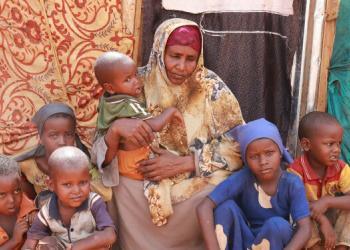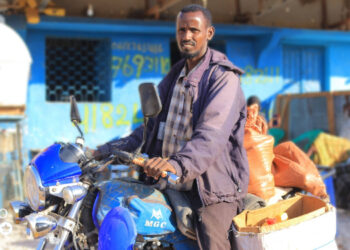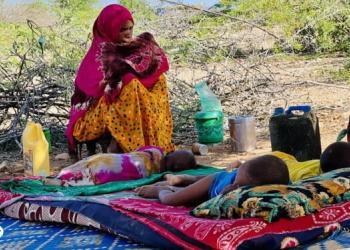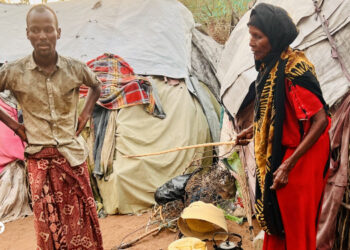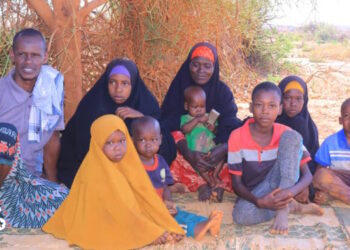(ERGO) – Abdullahi Hassan Mohamed walks to open up his small shop in Dollow town in southern Somalia every morning, feeling happy that at the age of 31 he has finally left behind the uncertainty of his former pastoralist life.
Abdullahi, who sells foodstuffs and household goods, earns a daily profit of $8, which helps him support his two children as well as his nine siblings. He says he no longer worries about meeting basic needs such as food, which was once a major challenge.
“It’s so different having had to depend on others and now being able to earn my own living. Before if the family had lunch, they wouldn’t always have dinner. We couldn’t afford three meals a day. Now my children get what they need for school and they also attend Koranic studies. Thank God, I have my own shop,” he told Radio Ergo.
His family lost about 100 of their own goats to the protracted drought in 2017 in Abore village in Dollow, forcing them into an internal displacement camp for an unhappy chapter of their lives.
Using the skills he had, Abdullahi took up a job in Bohol-Garas in Gedo herding other people’s livestock for $80 a month. Over the next six years he supported his family as best he could, although they also had to rely on humanitarian aid and assistance from neighbours and relatives.
He stashed away the bulk of his earnings in a savings group that he formed with fellow herders and used it to later get out of livestock herding altogether.
In March 2024, he ventured into business, opening his shop with the $4,800 he had carefully saved over those years. He then moved his family out of the miserable Kabaaso IDP camp.
“I bought them a plot of land, built a small shelter, and even installed water. I couldn’t have done that if I had remained a herder working for others,” he said.
He is now paying off the $330 he spent on the land in monthly installments. He hopes to expand his business this year to include clothing and footwear sales to augment his income.
Another pastoralist who suffered losses due to climate crises and managed to turn his life around is Ali Abdirahman Omar.
After losing his own herd to drought, he herded other people’s livestock for six years for a humble wage and invested his savings to start his own business in July 2024. He now buys livestock from pastoralists and transports them to major towns to sell.
Ali, 41, can now support his wife and eight children working only two weeks per month. On each trip, he sells 10 to 15 animals in markets Beledweyne, Baidoa, and Mogadishu.
Ali told Radio Ergo’s reporter that he started from scratch six months ago and the work is bringing stable income that has significantly improved his life and that of his family.
“Wherever I am told there is a livestock market, I take my animals there. That’s how I earn my living. On a trip, I make $200 to $300, which I use to support myself and my children,” he said.
In August he enrolled four of his children in grades one and two in school for the first time. He has much more time at home with his family these days, which had enhanced the family’s quality of life.
“Now I spend time with my children. If one gets sick, I take them to the hospital myself. I am aware of their well-being, unlike before,” he said.
His family has recovered from the hardships caused by the prolonged erratic weather patterns in Somalia, yet he still plans to reinvest in livestock when he has enough money.
Siyad Ahmed, 46, another former pastoralist, opened a shop selling women’s and children’s clothing in Aboore village in Dollow in February 2024. He funded the business with $1,500 that he saved over four years herding livestock.
He lost his own 34 camels and 145 goats to the devastating drought in 2018.
By 2021, he had no choice but to go to work as a hired herder to keep his family from starving. After years of struggle, his shop brings in a decent daily profit of six dollars that enables him to adequately support his six children.
“I manage various expenses, such as school fees, Koranic studies, and children’s needs. Before, I was an employee working for others. Now, I can afford three meals a day and provide for my family myself,” Siyad said.


